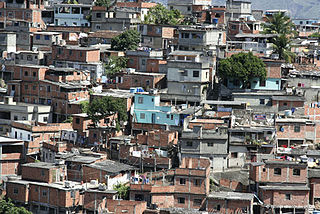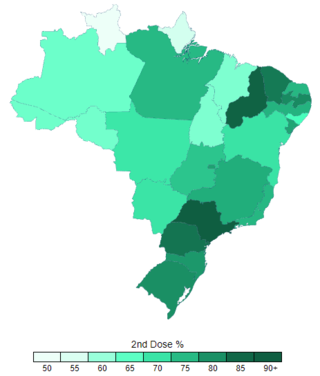
Brazil, officially the Federative Republic of Brazil, is the largest country in South America and in Latin America. Brazil is the world's fifth-largest country by area and the seventh most populous. Its capital is Brasília, and its most populous city is São Paulo. The federation is composed of the union of the 26 states and the Federal District. It is the only country in the Americas to have Portuguese as an official language. It is one of the most multicultural and ethnically diverse nations, due to over a century of mass immigration from around the world, and the most populous Roman Catholic-majority country.

The climate in Brazil varies considerably from mostly tropical north to temperate zones south of the Tropic of Capricorn. For further information on the latter, please see the Climate of South Brazil and Climate of Southeast Brazil pages.

Brazil ranks 49.3 in the Gini coefficient index, with the richest 10% of Brazilians earning 43% of the nation's income, the poorest 34% earn less than 1.2%.

Crime in Brazil involves an elevated incidence of violent and non-violent crimes. Brazil's homicide rate was 27.4 per 100,000 inhabitants, according to the United Nations Office on Drugs and Crime (UNODC). Brazil has the highest number of intentional homicides in the world, with 57,358 in 2018. In recent years, the homicide rate in Brazil has begun to decline. The homicide rate was 20.64 per 100,000 in 2020 with 43,879 killings, similar to 2019, but down from 30.67 per 100,000 in 2017.

The 2009 swine flu pandemic in Brazil began on April 25, 2009, with two people, spreading to 34 over the first two weeks. CDC calculate that Africa and Southeast Asia, which have 38% of the world's population, accounted for a disproportionate 51% of the deaths.

A series of floods and mudslides took place in January 2011 in several towns of the Mountainous Region, in the Brazilian state of Rio de Janeiro. Casualties occurred in the cities of Nova Friburgo, Teresópolis, Petrópolis, Bom Jardim, Sumidouro and São José do Vale do Rio Preto. The floods caused at least 916 deaths, including 424 in Nova Friburgo and 378 in Teresópolis. While local media claims that the combination of floods, mudslides and landslides in Rio de Janeiro became the worst weather-related natural disaster in Brazilian history, some contend that a similar weather-related tragedy that took place in the same state in 1967 was much deadlier, and that an estimated 1,700 people lost their lives on that occasion.

This is a timeline of Brazilian history, comprising important legal and territorial changes and political events in Brazil and its predecessor states. To read about the background to these events, see History of Brazil.

Events in the year 2019 in Brazil.

Events in the year 2020 in Brazil.

The COVID-19 pandemic in Brazil has resulted in 37,721,749 confirmed cases of COVID-19 and 704,659 deaths. The virus was confirmed to have spread to Brazil on 25 February 2020, when a man from São Paulo who had traveled to Italy tested positive for the virus. The disease had spread to every federative unit of Brazil by 21 March. On 19 June 2020, the country reported its one millionth case and nearly 49,000 reported deaths. One estimate of under-reporting was 22.62% of total reported COVID-19 mortality in 2020.

Events in the year 2021 in Brazil.

The COVID-19 vaccination campaign in Brazil is an ongoing mass immunization campaign for the COVID-19 pandemic in Brazil. It started on January 17, 2021, when the country had 210 thousand deaths.

Events in the year 2022 in Brazil.
On January 24, 2022, three men killed Moïse Mugenyi Kabagambe, a Congolese immigrant in Brazil, in a beach kiosk called Tropicália in Rio de Janeiro.
Miss Brazil World 2015 was the 26th edition of the Miss Brazil World pageant and 10th under MMB Productions & Events. During this pageant MMB Productions & Events became CNB Miss Brazil, thus this is the 1st under CNB Miss Brazil. The contest took place on June 27, 2015. Each state, the Federal District and various Insular Regions & Cities competed for the title. Julia Gama of Rio Grande do Sul originally crowned Ana Luísa Castro of Sergipe at the end of the contest but Castro resigned the title after the contest due to having an unrecognized marriage outside of Brazil in Belgium and wanting to get her marriage recognized in Brazil. As a result, Catharina Choi of Ilhabela was crowned as the Miss Brazil World 2015 by Castro. Choi represented Brazil at Miss World 2015. The contest was held at the Pedro Ivo Theater in Florianópolis, Santa Catarina, Brazil.

Linda Brasil Azevedo Santos is a teacher, LGBT rights activist, and politician who became the first trans woman elected to a parliamentary position in the state of Sergipe, Brazil. She was elected in 2020 as a member of the Socialism and Liberty Party.
Miss Brazil 2015, officially Miss Brazil Be Emotion 2015, was the 61st edition of the Miss Brazil pageant. It was held on 18 November 2015 at Citibank Hall in São Paulo, and was hosted by Cássio Reis and Mariana Weickert. Melissa Gurgel of Ceará crowned her successor Marthina Brandt of Rio Grande do Sul at the end of the event. Brandt represented Brazil at the Miss Universe 2015 pageant and placed in the Top 15.

The second presidency of Luiz Inácio Lula da Silva started on 1 January 2023, when he was inaugurated as the 39th President of Brazil. Lula was elected for a third term as President of Brazil on 30 October 2022, by obtaining 50.9% of the valid votes in the 2022 Brazilian general election, defeating his far-right predecessor Jair Bolsonaro. Lula is the first Brazilian president to ever be elected more than twice as well as being the oldest person to ever be elected president in Brazil.

Events in the year 2023 in Brazil.
The murder of Durval Teófilo Filho took place on the night of 2 February 2022 in São Gonçalo, Rio de Janeiro, Brazil. He was shot by a neighbour as he arrived at the building where he lived, who he allegedly thought was a burglar.










